Erdogan’s party loses parliamentary majority
After four elections, AKP has failed to maintain its majority. The pro-Kurdish HDP secured seats in parliament for the first time.
Agencies, The Guardian, BBC · ISTANBUL · 08 JUNE 2015 · 19:45 CET
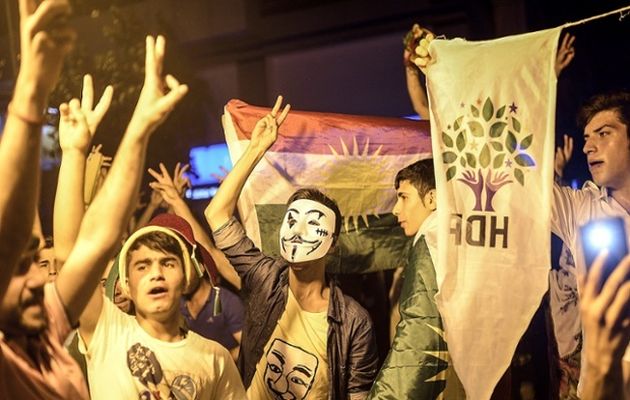
Sunday’s vote was the first time in four general elections to see a fall in support for Erdogan. While the AKP comfortably managed to secure the biggest portion of the vote, its 41% share of seats represents a sharp drop from its performance the 2011 elections, when it won nearly half the national vote.
For the first time since 2002, the AKP will need to form a coalition government or call new elections.
Turkey's President Recep Tayyip Erdogan has said the inconclusive election result means no party can govern alone. His party, AKP, is meeting to try to form a government after losing its majority in a general election for the first time in 13 years.
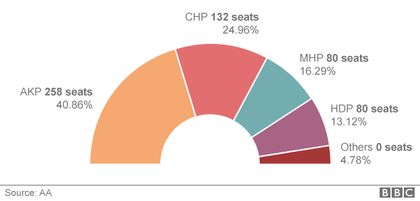
It secured 41%, a sharp drop from 2011, and must form a coalition or face entering a minority government. Mr Erdogan has called on all parties to "preserve the atmosphere of stability" in Turkey.
"I believe the results, which do not give the opportunity to any party to form a single-party government, will be assessed healthily and realistically by every party," Mr Erdogan said.
The pro-Kurdish HDP crossed the 10% threshold, securing seats in parliament for the first time.
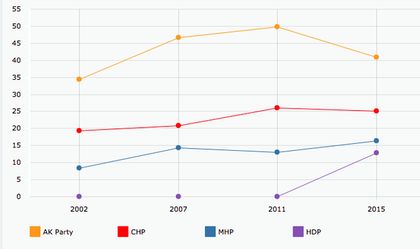
"The discussion of executive presidency and dictatorship have come to an end in Turkey with these elections," said HDP leader Selahattin Demirtas.
NEGOTIATIONS TO FORM A GOVERNMENT
It remains unclear who will be a likely partner for the AKP after the most likely candidate, the right-wing Nationalist Movement party (MHP) ruled out the possibility of a coalition.
According to the state-run Anadolu agency, the party leader, Devlet Bahceli, said the party was “ready to be a main opposition party” against an AKP-led coalition or minority government during a speech from party headquarters in Ankara early on Monday.
Selahattin Demirtas, co-chair of the leftist HDP, also dismissed any possibility of a coalition with the AKP.
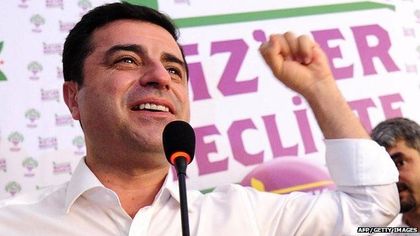
“We will not form a coalition with the AKP. We stand behind our words. We will be in parliament as a strong opposition,” Demirtas declared in a press conference in Istanbul on Sunday night.
Coalition talks will dominate the coming weeks in Turkey after voters snubbed the president’s plans to change the constitution and extend his grip on power, delivering the biggest blow to the AKP since it swept to power in 2002
Opposition parties may yet try to form a coalition against the AKP. But Numan Kurtulmus, one of Turkey's four deputy prime ministers, said there would be no government without representation by the AKP.
Prime Minister Ahmet Davutoglu is meeting AKP cabinet members and officials to assess the election results in Ankara. After the official final result is declared, he will have 45 days to form a government.
“Our nation’s opinion is above everything else,” Erdogan said in his first public reaction to the parliamentary elections on Sunday.
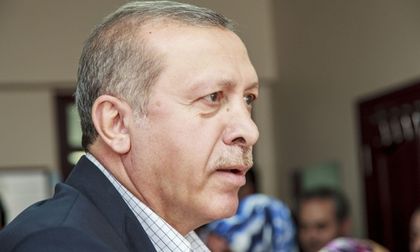
KURDS SITUATION
The election breakthrough for the leftist HDP, a new party largely representing the Kurds but also encompassing liberals nationally, was greeted with wild celebrations in the Kurdish-majority city of Diyarbakir in south-eastern Turkey.
The results will give the Kurds – who, with 20% of Turkey’s population, are the country’s biggest minority – true representation in parliament. The HDP surpassed the steep 10% threshold for entering parliament to take more than 12% of the vote and around 80 seats in the 550-strong chamber. The party’s result also denied Erdogan’s AKP its majority.
Another record was set by the number of women MPs set to take a seat in parliament after an unofficial tally estimated a total of 96 female parliamentarians securing a place in the Turkish grand national assembly – a record high and up from 79 in 2011.
On Monday morning, the Turkish currency fell to near-record lows against the dollar, and shares dropped by more than 8% soon after the Istanbul stock exchange opened. The central bank acted quickly to prop up the lira by cutting the interest rate on foreign currency deposits.
Published in: Evangelical Focus - europe - Erdogan’s party loses parliamentary majority
